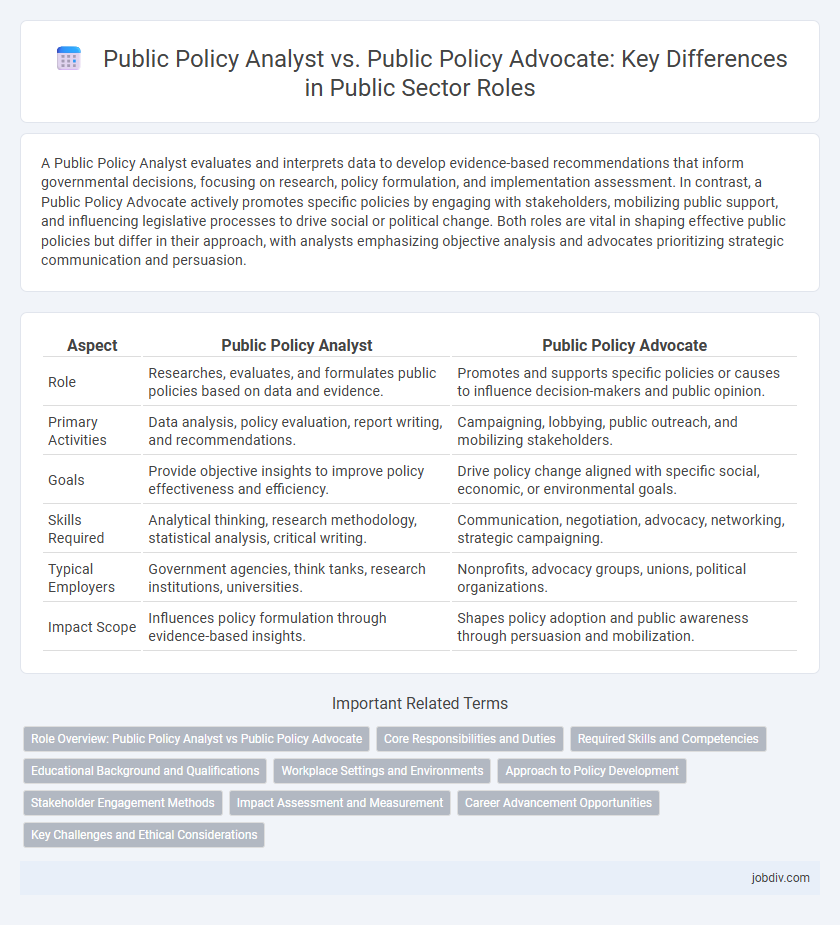A Public Policy Analyst evaluates and interprets data to develop evidence-based recommendations that inform governmental decisions, focusing on research, policy formulation, and implementation assessment. In contrast, a Public Policy Advocate actively promotes specific policies by engaging with stakeholders, mobilizing public support, and influencing legislative processes to drive social or political change. Both roles are vital in shaping effective public policies but differ in their approach, with analysts emphasizing objective analysis and advocates prioritizing strategic communication and persuasion.
Table of Comparison
| Aspect | Public Policy Analyst | Public Policy Advocate |
|---|---|---|
| Role | Researches, evaluates, and formulates public policies based on data and evidence. | Promotes and supports specific policies or causes to influence decision-makers and public opinion. |
| Primary Activities | Data analysis, policy evaluation, report writing, and recommendations. | Campaigning, lobbying, public outreach, and mobilizing stakeholders. |
| Goals | Provide objective insights to improve policy effectiveness and efficiency. | Drive policy change aligned with specific social, economic, or environmental goals. |
| Skills Required | Analytical thinking, research methodology, statistical analysis, critical writing. | Communication, negotiation, advocacy, networking, strategic campaigning. |
| Typical Employers | Government agencies, think tanks, research institutions, universities. | Nonprofits, advocacy groups, unions, political organizations. |
| Impact Scope | Influences policy formulation through evidence-based insights. | Shapes policy adoption and public awareness through persuasion and mobilization. |
Role Overview: Public Policy Analyst vs Public Policy Advocate
Public Policy Analysts leverage data research and critical evaluation to inform decision-makers on policy formulation, focusing on empirical evidence and outcome predictions. Public Policy Advocates prioritize influencing legislation and public opinion by mobilizing stakeholders and communicating policy implications with persuasive strategies. Both roles are essential in shaping effective governance but differ in approach--analysis versus advocacy.
Core Responsibilities and Duties
Public Policy Analysts conduct research, analyze data, and evaluate policy options to provide evidence-based recommendations for effective decision-making. Public Policy Advocates focus on promoting specific policies, engaging stakeholders, and influencing legislative or regulatory processes to achieve desired social or political outcomes. While analysts prioritize objective assessment and strategy development, advocates emphasize communication, persuasion, and mobilization to drive policy change.
Required Skills and Competencies
Public Policy Analysts require strong analytical skills, proficiency in data interpretation, and the ability to conduct thorough research to evaluate policy impacts effectively. Public Policy Advocates need exceptional communication skills, persuasive abilities, and expertise in stakeholder engagement to influence public opinion and policy decisions. Both roles demand a deep understanding of political systems, policy frameworks, and critical thinking capabilities to navigate complex regulatory environments.
Educational Background and Qualifications
Public Policy Analysts typically hold advanced degrees in political science, economics, or public administration, with strong analytical and research skills in data interpretation and policy evaluation. Public Policy Advocates often possess degrees in law, social sciences, or public relations, emphasizing communication, lobbying, and grassroots mobilization expertise. Both roles require relevant certifications or experience in government and nonprofit sectors, but Analysts prioritize quantitative skills while Advocates focus on strategic influence and stakeholder engagement.
Workplace Settings and Environments
Public Policy Analysts primarily work in government agencies, research institutions, and think tanks where they focus on data analysis and policy evaluation. Public Policy Advocates are often found in non-profit organizations, grassroots movements, and lobbying firms, directly engaging with communities and policymakers to influence legislative outcomes. Both roles require collaboration but differ in their emphasis on analytical research versus active advocacy within diverse workplace environments.
Approach to Policy Development
Public Policy Analysts rely on data-driven research and comprehensive evaluation methods to assess policy impacts and recommend evidence-based solutions. Public Policy Advocates prioritize stakeholder engagement and grassroots mobilization to influence policy decisions and drive social change. Both approaches contribute to shaping effective policies but differ in their emphasis on analytical rigor versus community involvement.
Stakeholder Engagement Methods
Public Policy Analysts employ quantitative and qualitative research techniques, including surveys, focus groups, and data analytics, to gather stakeholder input and inform evidence-based policy recommendations. Public Policy Advocates prioritize direct communication methods such as grassroots mobilization, coalition-building, and public forums to influence policymakers and engage community members. Both roles rely on strategic stakeholder mapping to identify key influencers and optimize engagement effectiveness in policy development processes.
Impact Assessment and Measurement
Public Policy Analysts specialize in impact assessment by systematically evaluating policy outcomes using quantitative and qualitative data to measure effectiveness and inform decision-making. Public Policy Advocates prioritize impact measurement through community engagement and qualitative feedback to shape policies that reflect constituent needs and drive social change. Both roles are essential for evidence-based policy development, with analysts focusing on data-driven evaluations and advocates emphasizing stakeholder perspectives.
Career Advancement Opportunities
Public Policy Analysts often experience career advancement through specialization in data analysis, economic evaluation, and legislative research, enabling transitions into senior analyst roles or policy advisory positions within government agencies. Public Policy Advocates advance by building extensive networks with stakeholders, mastering advocacy strategies, and leading campaigns that influence legislation, which can lead to leadership roles in nonprofit organizations, lobbying firms, or governmental advisory boards. Both career paths require continuous skill development in policy formulation, stakeholder engagement, and strategic communication to enhance professional growth and impact.
Key Challenges and Ethical Considerations
Public Policy Analysts face key challenges in data interpretation accuracy and impartiality while ensuring policy recommendations are evidence-based and unbiased. Public Policy Advocates confront ethical considerations related to transparency, representing diverse stakeholder interests, and avoiding manipulation or misinformation to influence public opinion or legislation. Both roles require a commitment to ethical standards to maintain public trust and promote equitable policy outcomes.
Public Policy Analyst vs Public Policy Advocate Infographic

 jobdiv.com
jobdiv.com